Background
Boulding, Kenneth Ewart was born on January 18, 1910 in Liverpool, England. Came to the United States, 1937, naturalized, 1948. Son of William Couchman and Elizabeth Ann (Rowe) Boulding.


(Fundamentals of Engineering Economic Analysis, 1st editio...)
Fundamentals of Engineering Economic Analysis, 1st edition provides streamlined topical coverage with a modern and pedagogically-rich presentation. This text features a wealth of real-world vignettes to reinforce how students will use economics in their future careers as well as to drive student motivation and interest. An enlightening approach combined with strong digital offerings make the course manageable, equipping students with the knowledge they need as future engineers.
http://www.amazon.com/gp/product/1118414705/?tag=2022091-20

( The human race has often put a high value on struggle, ...)
The human race has often put a high value on struggle, strife, turmoil, and excitement. Peace has been regarded as a utopian, unattainable, perhaps dull ideal or as some random element over which we have no control. However, the desperate necessities of the nuclear age have forced us to take peace seriously as an object of both personal and national policy. Stable Peace attempts to answer the question, If we had a policy for peace, what would it look like? A policy for peace aims to speed up the historically slow, painful, but persistent transition from a state of continual war and turmoil to one of continual peace. In a stable peace, the war-peace system is tipped firmly toward peace and away from the cycle of folly, illusion, and ill will that leads to war. Boulding proposes a number of modest, easily attainable, eminently reasonable policies directed toward this goal. His recommendations include the removal of national boundaries from political agendas, the encouragement of reciprocal acts of good will between potential enemies, the exploration of the theory and practice of nonviolence, the development of governmental and nongovernmental organizations to promote peace, and the development of research in the whole area of peace and conflict management. Written in straightforward, lucid prose, Stable Peace will be of importance to politicians, policy makers, economists, diplomats, all concerned citizens, and all those interested in international relations and the resolution of conflict.
http://www.amazon.com/gp/product/0292764480/?tag=2022091-20
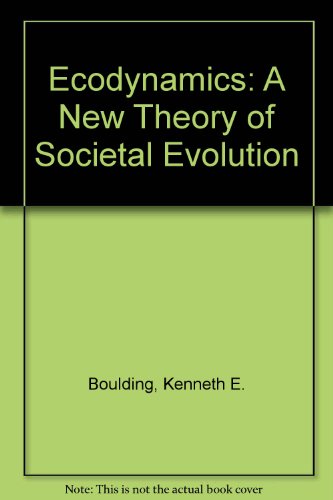
(Since its publication in 1979, this classic exposition of...)
Since its publication in 1979, this classic exposition of how society evolves has commanded the attention of both readers and reviewers. In 1981 a new paperback edition was printed, in order to make the book more widely available. '...the book is an astonishing triumph. For those of us who find something lacking in the narrow precision of our professional work, merely to undertake a synthesis of such breadth is an act of considerable courage. To have succeeded to the extent that Boulding has is an achievement on a scale difficult to contemplate.' -- Contemporary Psychology, September 1979 'Boulding's masterwork is full of wise and provocative insights into an amazing range of phenomena. It is one of those b
http://www.amazon.com/gp/product/0803909454/?tag=2022091-20
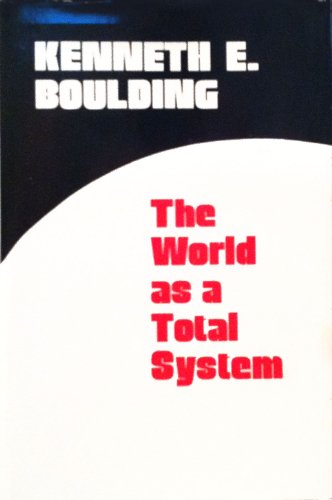
(A sequel to Boulding's Ecodynamics (SAGE 1978), this new ...)
A sequel to Boulding's Ecodynamics (SAGE 1978), this new book looks at the extent to which the earth is a total system of interacting parts and the degree to which it is a pattern of isolated systems which have little or no impact on one another. Descriptions of systems are based as much as possible on their relevance to the real world. Boulding's methodology depends on the nature of the particular system being investigated and he does not attempt to to impose methodologies from systems where parameters do not change (celestial mechanics) on those where they do (biological and social sciences).
http://www.amazon.com/gp/product/0803924437/?tag=2022091-20
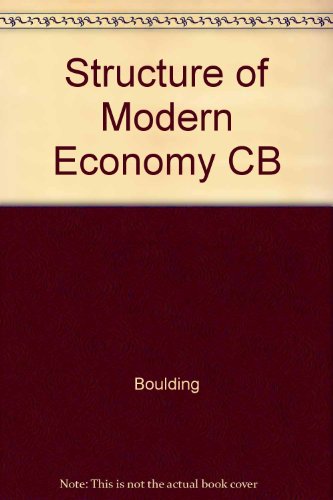
( One of the important sources for the increase of human ...)
One of the important sources for the increase of human knowledge is the keeping of careful records of a system over time, the study of which may reveal patterns and relationships that otherwise would not be perceived. Despite the existence of more than 60 years of national income statistics and their various components and supplements, such as unemployment and labor force figures, price levels, relative prices, etc, there has been a dismaying lag in the use of this data to detect previously unrecognized relationships among economic variables. One of the reasons for this disturbing lack of attention to such patterns is the 18th-century celestial-mechanics type of mathematics that is generally in use. Deterministic dynamic mathematical models are often inappropriate to the structural and topological complexities of the economic system, particularly to the instability of its fundamental parameters. This intriguing new book is a step towards an interpretation of the record in terms of topological patterns represented by a variety of graphs. The type of long-run topological analysis on which this book is based reveals some striking properties of the American economy which conventional economics and econometrics have tended to miss. One of these is the relative insignificance of the Federal government, even during the period of the New Deal. Also suggested by the data are the unexpected effects of governmental action. Preeminent economist Kenneth Boulding offers this study not only as a means of coming to a better understanding of our past and present economic systems, but also as an aid to decision-making about the future. If the decisions made in the present are based on unrealistic inferences, he maintains, then they are likely to make the future worse than it might have been.
http://www.amazon.com/gp/product/0814712037/?tag=2022091-20

(This scarce antiquarian book is a facsimile reprint of th...)
This scarce antiquarian book is a facsimile reprint of the original. Due to its age, it may contain imperfections such as marks, notations, marginalia and flawed pages. Because we believe this work is culturally important, we have made it available as part of our commitment for protecting, preserving, and promoting the world's literature in affordable, high quality, modern editions that are true to the original work.
http://www.amazon.com/gp/product/1432580914/?tag=2022091-20

(What does a relationship with God look like and how do we...)
What does a relationship with God look like and how do we obtain it? It is vital for church leaders to grapple seriously with this question, for pat answers no longer suffice. Lives well-lived, not just words eloquently spoken, must become our response. The quality of our relationship with God is what will influence the health, potency, and witness of the church in an increasingly complex and hostile world. Designed for use as a college or seminary course, Conformed to His Image helps us build our lives on a fully biblical perspective. Exploring twelve approaches to Christian spirituality in depth, Dr. Kenneth Boa corrects our tendency to pick and compartmentalize. Pointing the way instead to an integrative, whole-life approach, Dr. Boa shows how each spiritual paradigm discussed is just one important facet in the gem of authentic and powerful New Testament living. With chapter overviews and objectives, questions for personal application, a glossary, and a list of key terms, Conformed to His Image will prove a defining text for the student, pastor, and church leader of today . . . and tomorrow. 12 Facets of the Complete Christian Life Relational Spirituality: Loving God Completely, Ourselves Correctly, and Others Compassionately Paradigm Spirituality: Cultivating an Eternal versus a Temporal Perspective Disciplined Spirituality: Engaging in the Historical Differences Exchanged Life Spirituality: Grasping Our True Identity in Christ Motivated Spirituality: A Set of Biblical Incentives Devotional Spirituality: Falling in Love with God Holistic Spirituality: Every Component of Life under the Lordship of Christ Process Spirituality: Being versus Doing, Process versus Product Spirit-Filled Spirituality: Walking in the Power of the Spirit Warfare Spirituality: The World, the Flesh, and the Devil Nurturing Spirituality: A Lifestyle of Discipleship and Evangelism Corporate Spirituality: Encouragement, Accountability, and Worship
http://www.amazon.com/gp/product/031023848X/?tag=2022091-20
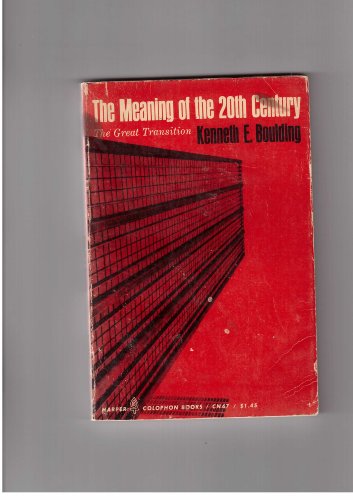
(As relevant today as when it was first published in 1965 ...)
As relevant today as when it was first published in 1965 by Harper and Row, this book looks at the 20th century as a critical era in the great transition from a civilized to a post-civilized society. The 20th century itself is seen as an ongoing evolutionary process. The author focuses on three "traps" which would prevent this transition from taking place: the "war trap", the "population trap", and the "entropy trap". And he outlines strategies for the 21st century for overcoming these traps.
http://www.amazon.com/gp/product/0819171026/?tag=2022091-20
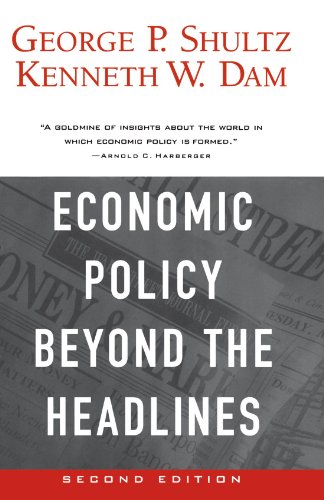
( Drawing from their experience as government insiders, G...)
Drawing from their experience as government insiders, George P. Shultz and Kenneth W. Dam show how economic policy is shaped at the highest levels of government. They reveal the interconnections between economic, social, and international policy, covering issues such as the advocacy system and the role of the individual in shaping policy. A new chapter, 'A Changed World,' explores the various influences of our increasingly global economy on economic strategy. With rare candor, authority and breadth of vision, Shultz and Dam have produced a brilliant introduction to economic policy, its principles, and practice. "A model of brevity and lucidity . . . [Economic Policy Beyond the Headlines] incorporates a unique and rewarding blend of economic reasoning with a high level of political awareness . . . enriched by the wide personal experience in government of the authors."—Albert T. Sommers, Across the Board "[Shultz and Dam] help foreign readers to understand why the world looks so different from Washington. . . . This book should provide the model."—The Economist "A wise and valuable book showing great insight into the realities of economic policy making."—Henry A. Kissinger
http://www.amazon.com/gp/product/0226755991/?tag=2022091-20
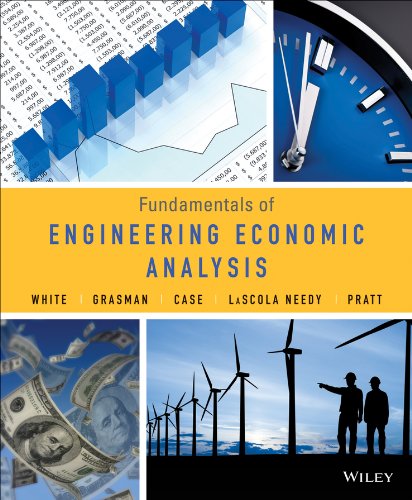
( This package includes a copy of ISBN 9781118414705 and ...)
This package includes a copy of ISBN 9781118414705 and a registration code for the WileyPLUS course associated with the text. Before you purchase, check with your instructor or review your course syllabus to ensure that your instructor requires WileyPLUS. For customer technical support, please visit http://www.wileyplus.com/support. WileyPLUS registration cards are only included with new products. Used and rental products may not include WileyPLUS registration cards. Fundamentals of Engineering Economic Analysis, 1st edition provides streamlined topical coverage with a modern and pedagogically-rich presentation. This text features a wealth of real-world vignettes to reinforce how students will use economics in their future careers as well as to drive student motivation and interest. An enlightening approach combined with strong digital offerings make the course manageable, equipping students with the knowledge they need as future engineers.
http://www.amazon.com/gp/product/1118842480/?tag=2022091-20
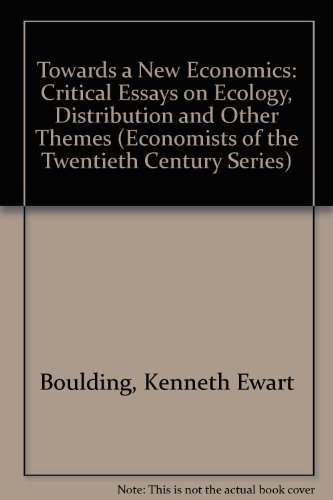
(Kenneth Boulding has, in the course of his career, made a...)
Kenneth Boulding has, in the course of his career, made a contribution to many branches of economics. This book presents in one volume a selection of his most important recent papers and essays. In the first part of the book, Professor Boulding pushes economics towards a more evolutionary type of theory, towards a greater interest in the real world and towards some fairly specific theoretical positions. He stresses the importance of positive feedback as well as equilibrium processes. The second part focuses on the grants economy, that is the study of the economics of one-way transfers. In part three, he turns his attention to international economic relations particularly the economics of conflict in unilateral national defence. The final part is on ecological systems, stressing that economies are essentially an eco-system of commodities, part of the total eco-system of the world, which is undergoing a constant and irreversible evolutionary change.
http://www.amazon.com/gp/product/1852785683/?tag=2022091-20

(This book examines the increasing role and growing depend...)
This book examines the increasing role and growing dependence on private military companies (PMCs) by the U.S. government, in particular, the U.S. Air Force (USAF). It highlights potential areas of concern when using PMCs to provide combat capabilities, and offers possible solutions for solving or mitigating these problems in future conflicts. The main argument of this book is that the role of PMCs has become blurred with traditional governmental unctions, and that their use in future conflicts should be evaluated based on monetary, personnel, and material savings for the USAF and its abilities to balance international and domestic political needs and objectives, while accomplishing its national security mission. This book will answer the following questions: How does the USAF use PMCs in aspects of control, oversight, and accountability during conflicts, and what are the main challenges for the USAF concerning contracting PMCs to provide combat capability?
http://www.amazon.com/gp/product/B00DBF3BIY/?tag=2022091-20
Boulding, Kenneth Ewart was born on January 18, 1910 in Liverpool, England. Came to the United States, 1937, naturalized, 1948. Son of William Couchman and Elizabeth Ann (Rowe) Boulding.
Student, Oxford University, 1932. Bachelor with 1st class honors, Oxford University, 1931. Master of Arts, Oxford University, 1939.
Postgraduate, University Chicago, 1934. Over 30 honorary degrees.
Assistant University Edinburgh, Scotland, 1934-1937. Instructor Colgate University, 1937-1941. Economist League of Nations Economic and Finance Section, 1941-1942.
Professor Fisk University, 1942-1943. Associate professor Iowa State College, 1943-1946, professor, 1947-1949. Angus professor political economy McGill University, 1946-1947.
Professor economics University Michigan, 1949-1968, research director Center for Research in Conflict Resolution, 1964-1966. Visiting professor University Colorado, Boulder, 1967-1968, professor, 1968-1977, distinguished professor, 1977-1980, distinguished professor emeritus, 1980-1993, director program on general social and economic dynamics Institute Behavioral Science, 1967-1981, research associate, project director program on political and economic change, 1981-1993. Visiting professor University College West Indies, Kingston, Jamaica, 1959-1960, University Natal, 1970, University Edinburgh, fall 1972, Joseph H. Lauder Institute, University Pennsylvania, June 1984, Butler University, fall 1984, University Colorado, fall 1986, Adlai E. Stevenson College, University California, Santa Cruz, spring 1987, Fort Lewis College, Durango, Colorado, spring 1987.
Danforth visiting professor International Christian University, Tokyo, 1963-1964, Aoyama Gakuin University, Tokyo, May, June 1991, July 1992. Visiting lecturer Japanese Broadcasting Company, Tokyo, 1970, Patten lecturer Indiana University, Bloomington, fall 1973. Andrew D. White professor-at-large Cornell University, 1974-1979.
Barnette Miller visiting professor Wellesley College, fall 1975. Distinguished Visiting Tom Slick professor world peace L.B. Johnson School, University Texas, Austin, 1976-1977. Montgomery visiting professor Dartmouth College, fall 1978.
Distinguished visiting professor School Public Administration, Ohio State University, spring 1981. Winegard visiting professor University Guelph, Ontario, Canada, fall 1981. Downing fellow Melbourne (Australia) University, spring 1982.
Eugene M. Lang visiting professor social change Swarthmore College, 1982-1983. A. Lindsay O'Connor visiting professor American institutions Colgate University, fall 1983. 1st visiting scholar United Nations University, Tokyo, spring 1984.
Aspinall visiting professor Mesa College, April 1984. Mitchell distinguished visiting professor Trinity University, spring 1985. Distinguished visiting professor, George Mason University, fall 1985.
Visiting scholar Russell Sage Foundation, New York, spring 1986. Friend in residence Pendle Hill, Wallingford, Pennsylvania, fall 1988. Hitchcock visiting professor University California, 1989.
Robinson visiting professor George Mason University, Fall 1989.
John Bates Clark Medal, President, American Economic Association, 1949,1968. American Council Learned Socs. Prize Distinguished Scholarship Humanities, 1962.
Frank
E. Seidman Distinguished Award Political Economics, 1976. President, American Academy of Arts and Sciences 1979. Member, Senior Member, Institute, Institution Medicine, National Academy of Sciences, USA, since 1975.
Corresp. Fellow, British Academy, 1982. President, Section F, British Association for the Advancement of Science, 1982-1983.
(A sequel to Boulding's Ecodynamics (SAGE 1978), this new ...)
( One of the important sources for the increase of human ...)
(As relevant today as when it was first published in 1965 ...)
(What does a relationship with God look like and how do we...)
(Fundamentals of Engineering Economic Analysis, 1st editio...)
(Since its publication in 1979, this classic exposition of...)
(A new model of economic life that looks at it in terms of...)
( This package includes a copy of ISBN 9781118414705 and ...)
(This book examines the increasing role and growing depend...)
(Kenneth Boulding has, in the course of his career, made a...)
( The human race has often put a high value on struggle, ...)
(In this highly personal work, Boulding traces his lifelon...)
(This scarce antiquarian book is a facsimile reprint of th...)
( Drawing from their experience as government insiders, G...)
(Rebound by library,This book has hardback covers.Ex-libra...)
(Rebound by library,This book has hardback covers.Ex-libra...)
( The social philosophy of Kenneth Boulding )
(Book by Boulding, Kenneth Ewart)
(Book by Boulding, Kenneth Ewart)
(Book by Boulding, Kenneth Ewart)
(Book by Boulding, Kenneth E.)
(Book by Hamilton, Kenneth)
Author: Economic Analysis, 1941, 4th review edition, 1966, Economics of Peace, 1945, reissued, 1972, There is a Spirit (The Naylor Sonnets), 1945, review edition, 1992, A Reconstruction of Economics, 1950, The Organizational Revolution, 1953, reissued, 1984, The Image, 1956, Principles of Economic Policy, 1958, The Skills of the Economist, 1958, Conflict and Defense, 1962, reissued, 1988, The Meaning of the Twentieth Century, 1964, reissued, 1988, The Impact of the Social Sciences, 1966, Beyond Economics, 1968, Economics as a Science, 1970, reissued, 1988, A Primer on Social Dynamics, 1970, The Prospering of Truth (Swarthmore Lecture), 1970, Collected Papers, Vols. 1-5, 1971-1975, Volunteer 6, 1985, The Appraisal of Change (in Japanese), 1972, The Economy of Love and Fear, 1973, Sonnets from the Interior Life and Other Autobiographical Verse, 1975, Stable Peace, 1978, Ecodynamics, 1978, Beasts, Ballads and Bouldingisms, 1980, Evolutionary Economics, 1981, A Preface to Grants Economics, 1981, Human Betterment, 1985, The World as a Total System, 1985, Sonnets on Courtship, Marriage, and Family, 1987, second edition 1990, Three Faces of Power, 1989, Towards a New Economics, 1991, The Structure of Modern Economy: The United States 1929-1989, 1993. Author: (with Elise Boulding and Guy M. Burgess) The Social System of Planet Earth, 1977, 80.Editor: (with George J. Stigler) Readings in Price Theory, 1952. (with Washington Spivey) Linear Programming and the Theory of the Firm, 1960. (with Emile Benoit) Disarmament and the Economy, 1963.(with Tapan Mukerjee) Economic Imperialism, 1972. ( with Martin Pfaff) Redistribution to the Rich and the Poor, 1972. (with Martin and Anita Pfaff) Transfers in an Urbanized Economy, 1973.(with Thomas F. Wilson) Redistribution through the Financial System, 1978. (with Hassaram Rijhumal Porter) General Systems Yearbook, volunteer 23, 1979. (with Lawrence Senesh) The Optimum Utilization of Knowledge: Making Knowledge Serve Human Betterment, 1983.Edited Peace and the War Industry, 1970, 73, The Economics of Human Betterment, 1984. Bibliography of Published Works by Kenneth E. Boulding (1932-1984) compiled by Vivian L. Wilson, 1985.
Synthesised neoclassical and Keynesian economic theory into a coherent whole in Economic Analysis, especially fourth edition (1966). Urged economics down a new path in The Reconstruction of Economics (1949) with emphasis on stocks rather than flows and macro-theory of functional distribution. In work on Evolutionary Economics, have urged an integration of economic with biological concepts of ecological equilibrium and dynamics and genetic production.
Exchange is only one of three major organisers of social life, the others being the threat system and the integrative system. In work on Grants Economics I have argued that one-way transfers should be integrated into the body of economic theory. Elsewhere I have taken the view that economic policy cannot be judged by economic criteria alone and that a larger normative theory of evaluative judgement is possible.
Fellow American Academy Arts and Sciences, American Philosophical Society, Brit Academy (correspondent). Member American Economic Association (John B. Clark medal 1949, president 1968), National Academy of Sciences (senior member Institute Medicine), Society General Systems Research (president 1957-1959, Leadership award 1984), International Studies Association (vice president 1969-1970, president 1974-1975), American Association for the Advancement of Science (vice president, chairman section K 1966-1967, president 1979, chairman board directors 1980), Peace Research Society International (president 1969-1970), Association Study Grants Economy (president 1969-1989), British Association Advancement of Science (president section on economics 1982-1983).
Poetry, sketching, water-colors.
Married Elise Bjorn-Hansen, August 31, 1941. Children: Russell, Mark, Christine, Philip, William.
